Are you wondering if Turkey is safe for tourists? We have the answer to that question (and more!) in this guide to crime and safety in Türkiye. I reside in Türkiye and have done so for more than 12 years, so I know all too well about what it’s like here right now.
⚠️ Israel-Gaza update: Travel to Türkiye may be affected by the ongoing conflict in Israel due to their proximity, with Türkiye being located about 879 km north of Israel without sharing a border. However, Türkiye has not been directly impacted by the conflict. All embassies advise against travel to areas within 10km of the border with Syria. Still, the rest of Türkiye is deemed relatively safe despite a very high threat of terrorist activity. You should remain vigilant and avoid all demonstrations.
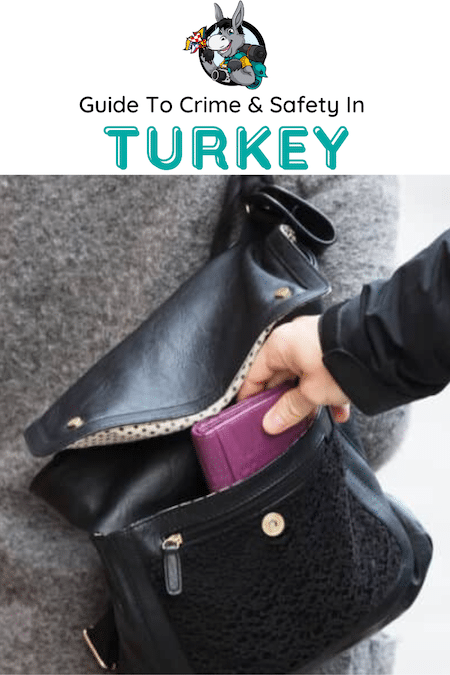
Looking for an exotic and thrilling destination to explore in 2024? Turkey might be the perfect place for you! With its rich history, stunning landscapes, and vibrant culture, this Eurasian country has recently become a popular tourist spot.
But with news of political unrest and rising crime rates making headlines worldwide, many travelers ask themselves: is Turkey a safe place to visit?
If you’re planning a trip to this fascinating land but don’t know what to expect regarding Turkish security concerns, look no further than our comprehensive guide on crime rates and safety measures in Turkey.
From major cities like Istanbul to remote villages off the beaten path, we’ll help you navigate the risks and confidently enjoy your adventure. So buckle up and get ready for an informative ride!
Skip Ahead To My Advice Here!
How Safe Is Turkey For Tourists?
Living here, I’ve often found Türkiye to be very secure, sometimes even more so than some spots in the UK and States. The locals are curious folks and don’t hesitate to lend a hand if things go south.
Turkey Travel Appeal As A Tourist Destination
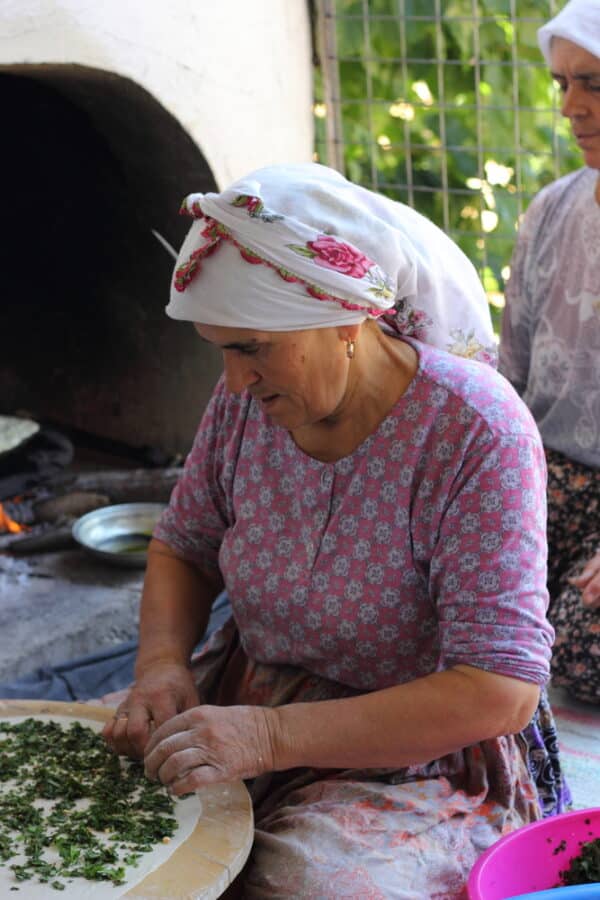
The Turkish border has eight countries: Greece, Georgia, Bulgaria, Armenia, Azerbaijan, Iran, Iraq, and Syria.
It has a population of over 84 million people and covers an area of 780,000 square kilometers. Türkiye is a republic with a parliamentary system of government, and its capital is Ankara. The official language is Turkish.
Türkiye is often referred to as the “gateway between East and West” due to its location at the crossroads of Europe and Asia.
The country has a rich culture and history that dates back to the ancient civilizations of Anatolia (the Asian part of modern Turkey). Today, Türkiye is a modern country with a thriving economy and a growing tourism industry.
In recent years, Türkiye has become one of the most popular tourist destinations in the world. According to the World Tourism Organization (UNWTO), Turkey was the 4th most visited country in 2021!
There are several reasons why Turkey is becoming such a popular tourist destination. The country has a diverse landscape with beautiful beaches, mountains, forests, and historical sites. Türkiye also offers excellent value for money with affordable accommodation, food, and activities. In addition, Turkish people are known for their hospitality, which makes visitors feel welcome and safe in the country.
Despite being a relatively safe country overall, some areas of Türkiye are more dangerous than others. Overall, the dangers of Turkey are low. Crime rates vary depending on the location, but Turkey is safe.
Crime Rates In Türkiye: How Safe Is Turkey
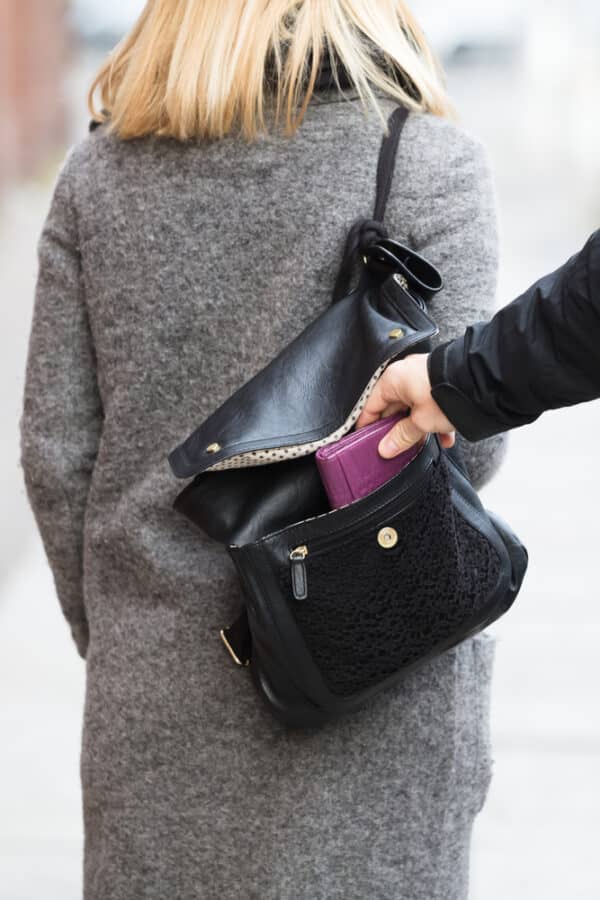
Turkey is a relatively safe country, but its crime rates have been increasing in recent years. According to the Turkish National Police, the number of violent crimes has increased – though still low enough to be considered safe. The most common crimes are
- Notoriously high levels of petty crime
- Pickpocketing
Both of these occur mostly in crowded areas like markets and tourist destinations. There has also been an elevated level of ATM robberies and credit card fraud.
While these crime statistics may seem alarming, it’s important to remember that Türkiye is still a relatively safe country, and these crime rates are much the same as other big cities across the globe.
The vast majority of visitors experience no problems while traveling in Turkey.
However, taking some basic safety precautions when traveling to Turkey, such as keeping your valuables hidden and being aware of your surroundings, is always a good idea.
If you do find yourself in a situation where you are being harassed or threatened, don’t be afraid to speak up or ask for help from the police or security guards.
Brands We Use And Trust
Other Safety And Security Issues In Türkiye
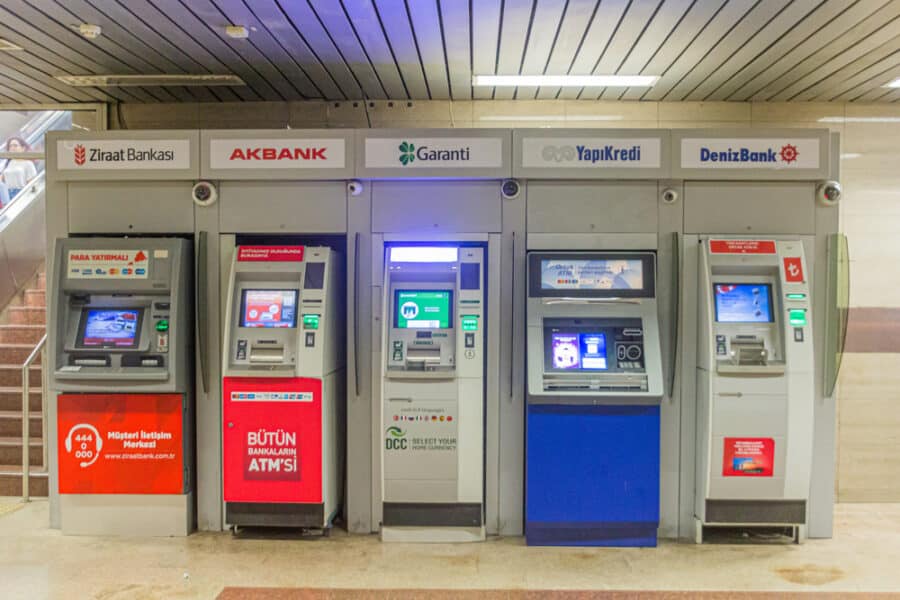
- Stray dogs
- Muggings
- Crimes of kidnapping
- Earthquakes
- Violent Demonstrations
- Frauds & scams (find the top 5 scams here)
Areas & Regions To Avoid In Türkiye

Turkey is generally a safe country for tourists, but there are some areas and regions that you should avoid.
The first area to avoid is the far southeast of the country. This region of Türkiye has been plagued by violence and crime in recent years, and it is unsafe for tourists.
Cities and provinces to avoid in the area are:
- Sirnak
- Kilis
- Bingol
- Hakkari
- Siirt
- Tunceli.
- Hakkari province
- Province of Hatay
You should also avoid traveling to the border regions. Particularly the Iraqi and Syrian border areas. These regions are unstable and dangerous, and they are unsafe for you.
Overall, Türkiye is a safe country for tourists, but you should avoid these areas and regions in Turkey.
2024 update: Popular tourist destinations like Gaziantep, Sanliurfa (Urfa), Mardin, and Diyarbakir have seen increased stability in recent years, and they’re fantastic places to go.
FAQs About Travel To türkiye & Staying Safe
Is Turkey Safe For Americans
Totally yes. Americans in Turkey are 100% safe. There are no political worries for Americans at all.
The US Department of State places Türkiye at a level 2, meaning ‘exercise increased caution.’
Is Turkey Safe For Solo Travelers

Turkey is a safe country for solo travelers, with a relatively low crime rate and many opportunities to meet other travelers. However, there are a few things to remember to stay safe while traveling in Turkey.
- It’s essential to be aware of your surroundings and trust your instincts. If you feel unsafe or uncomfortable in any situation, leave immediately
- Avoid walking alone at night or in poorly lit areas. If you must walk alone, keep to well-lit and busy streets
- Be cautious when using public transportation, especially at night. Avoid empty trains and buses, and try to travel with other people if possible
- Don’t flash your valuables in public or leave them unguarded in your hotel room. Keep your money and passport securely stored away when not in use
- Always let someone know where you’re going before heading out solo. This way, someone will know to check on you if you don’t return as expected
By following these simple safety precautions, you can ensure a safe and enjoyable trip while traveling solo in Türkiye.
Is Safe Safe To Travel To Turkey For Female Travelers
It is a common question that I am asked: Is it safe to travel to Turkey as a woman?”. Let me say that yes, Turkey is a safe country for female travelers, with a low incidence of crime towards female travelers and plenty of security measures in place wherever you go. However, it is always advisable to take precautions when traveling to any destination, and Türkiye is no different from any other big city across the globe.
Please read our guide on travel to Turkey as a female here.
Do US Citizens Need a Visa for Turkey?
Good news for US travelers – as of January 2024, the visa requirement for Türkiye has been lifted for you! This means you can enjoy visa-free travel, making your trip planning a whole lot smoother. Just pack your bags and go!
Do Australian & UK Citizens Need a Visa for Türkiye?
Yes, Aussie and UK citizens do need a visa to visit Türkiye. But don’t worry, it’s not a hassle. You can easily apply for an e-Visa online before your trip. It’s quick and straightforward, and you’ll usually get it sorted within minutes. Just fill out the form, pay the fee, and you’re all set for your Turkish adventure.
How Long Can I Stay in Türkiye?
On a standard tourist visa, you’re good for 90 days within a 180-day period. Thinking of hanging around longer? That means diving into the world of residence permits and trust me, it’s a bit of a maze. And heads up, entry rules can change, so do a quick check before you head out.
Is Turkey Safe For The LGBTQ+ Community
Türkiye is often considered a safe country for LGBTQ+ individuals, as there are no legal penalties for homosexual relations, and the government has taken steps to protect queer people from hate crimes.
However, homophobia is still prevalent in Turkish society, and violence against LGBTQ+ people does occur from time to time. The best way to stay safe as an LGBTQ+ individual in Türkiye is to be aware of the risks and take precautions against them.
Turkey is a predominantly Muslim country, and conservative attitudes toward homosexuality are common, especially in more rural areas.
There have been some reports of violence against LGBTQ+ people in Turkey, although it is difficult to know how widespread this problem is. The best way to stay safe is to avoid public displays of affection and being open about your sexuality in places that could put you at risk. If you are attacked or harassed, report the incident to the police.
Safety Measures To Consider When Visiting Turkey

Turkey is generally a safe country for tourists, but there are some safety measures to consider when visiting. The first is to be aware of your surroundings and stay alert in busy areas. If you are carrying valuables, keep them close to your body and out of sight. It is also a good idea to avoid wearing expensive jewelry or watches.
There have been reports of pickpocketing and bag snatching in Türkiye, so it is important to always keep your belongings close to you. Be especially careful on public transportation, as thieves often target tourists on these crowded platforms. If you are using an ATM, be sure to conceal your PIN and keep an eye on your surroundings.
As with any travel destination, researching the local laws and customs before visiting Turkey is always a good idea.
For example, there are strict laws about:
- It is against the law to drink alcohol in public places
- It is illegal to drive after consuming any alcohol
- It is also illegal to take photographs of military buildings or personnel
What To Do If Something Goes Wrong In Türkiye
If you find yourself in a situation where you feel unsafe, you can do a few things. First, try to stay calm and think clearly. If you can, move to a safe place away from the immediate danger. Then, call the police (dial 112) or other emergency services.
Public Transport In Turkey: How Safe Is It
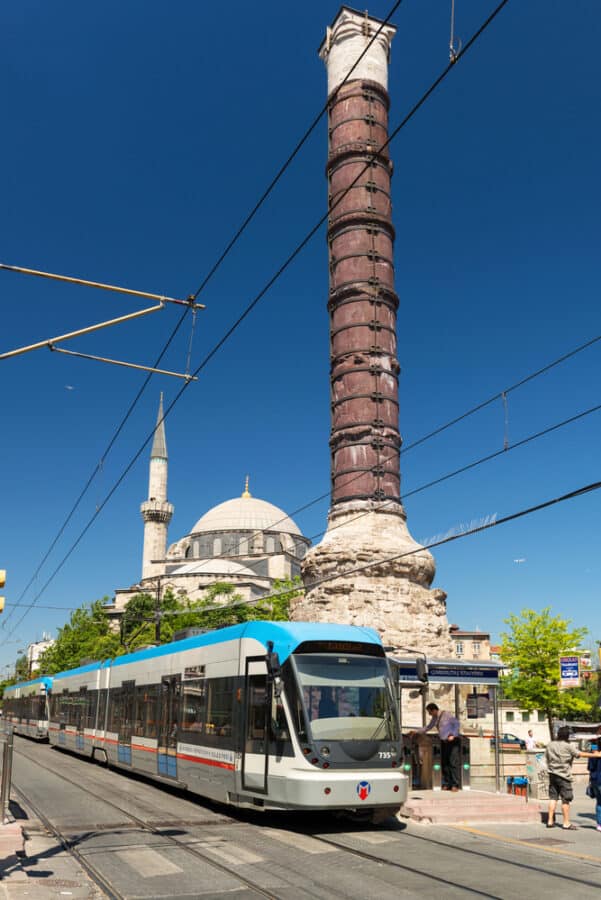
Public transportation in Türkiye is safe for tourists if you take precautions to avoid pickpockets and bag snatchings. Take care when using public transport at night. Be alert and aware of your surroundings, and don’t flash valuables in busy areas. If possible, use a licensed taxi driver or ride-sharing services.
Terrorism In Turkey
I left this to last, as it’s such a complicated topic. But the facts are facts. There have been previous terrorist attacks in Turkey. In fact, there have been several terrorist attacks globally in the past few years, and Turkey is no exception. I felt that not covering all the potential risks associated with traveling to Turkey would be unjust.
You should know that Turkey has faced several terrorist attacks throughout its history, perpetrated by a variety of terrorist groups for divergent political and ideological reasons.
The most recent was in October 2023 in Ankara, when a suicide bomb attack occurred in Turkey’s capital, Ankara, which has been attributed to the outlawed Kurdistan Workers’ Party (PKK). Turkish police have launched a wide security crackdown in response to the attack.
Before that was November 2022, when an explosion occurred on a busy Sunday afternoon on the streets of Istanbul. Istiklal Street, Taksim to be exact. This is one of the busiest parts of the city, where six people died and 81 were wounded. The threat of terrorism still exists from several groups, including:
- Kurdistan Workers’ Party (PKK) Attacks: The PKK, which seeks an independent Kurdish state, has been involved in a protracted armed conflict with the Turkish state since the 1980s. They have conducted numerous attacks, primarily in southeastern Turkey.
- ISIS Attacks: ISIS has claimed responsibility for several attacks on Turkish soil. One prominent attack was at Ataturk Airport in Istanbul in 2016, where 45 people were killed and over 230 were injured.
- Left-Wing Militant Attacks: Left-wing militant groups like the Revolutionary People’s Liberation Party/Front (DHKP/C) have also carried out attacks in Turkey, often targeting police and security forces.
- Al-Qaeda Attacks: Al-Qaeda has orchestrated attacks in Turkey, such as the 2003 bombings of synagogues, the British Consulate, and a British bank in Istanbul, which resulted in over 60 deaths and hundreds of injuries.
These examples demonstrate the complexity and multi-faceted nature of the threat of terrorist attacks faced by Turkey. The nation has seen incidents from nationalist, religious, and leftist militant groups, each with their distinct motives and methods.
How To Stay Safe Regarding Terrorism Threats
As there is the potential for terrorist attacks and civil unrest in any country you travel to, it is advisable to keep up to date with the local security situation. I like to do that through a few places, including
- this Australian travel advisory run by the Australian government
- or this one run by the United States Department of State
- British Nationals can find the same information on the Foreign Travel Advice board
Register your trip with your embassy or consulate and follow any guidance they provide as they keep abreast of the latest information with Turkish authorities on all potential threats.
Once you are in Türkiye, always be vigilant in public areas and always avoid participating in large gatherings and protest groups, as these can escalate into violence. Watch local media and follow the advice of local authorities.
You should also have a comprehensive travel insurance policy that covers terrorism (and medical evacuation) and ensures your loved ones have a copy of your travel itinerary.
Forest Fires In Türkiye
When planning a trip to Türkiye, it’s smart to stay informed about forest fires, a natural phenomenon that can impact certain areas, especially during dry seasons. Türkiye, known for its diverse landscapes, does experience forest fires, and being prepared is key to ensuring a safe and enjoyable trip.
How Often & Where?
Forest fires often occur in Türkiye during the summer months, typically from June to September. The regions most affected are often the Mediterranean and Aegean coasts, areas popular for their stunning beaches and scenic beauty.
Places like Antalya, Muğla, and Izmir have seen their share of fires in recent years. However, it’s worth noting that these incidents, while serious, aren’t an everyday occurrence and shouldn’t deter you from visiting these beautiful regions.
Staying Informed
Knowledge is power, especially when traveling. Keep an eye on local news and weather reports. The Turkish government and local authorities often issue warnings and updates if there’s a risk of fire. Additionally, apps and websites that track environmental conditions can be handy tools for real-time updates.
What To Do In Case Of A Forest Fire
- Stay Calm and Informed: if you’re near an area affected by a fire, stay calm. Keep up-to-date with local news and follow any instructions or evacuation orders from local authorities
- Safety First: if you find yourself in an area close to a fire, prioritize your safety. Follow evacuation routes and avoid trying to ‘explore’ or get a closer look
- Contact Your Embassy: in emergencies, it’s a good idea to contact your embassy. They can offer guidance and assistance if needed
- Local Emergency Services: know the contact details of local emergency services. In Türkiye, you can dial 112 for emergencies
After The Fires
Türkiye’s resilience in the face of natural challenges is noteworthy. Affected areas often bounce back surprisingly quickly, and supporting these regions through tourism can be a meaningful way to help local communities recover.
While forest fires are a reality in parts of Türkiye, they’re generally well-managed and shouldn’t overshadow the many wonders this country has to offer. By staying informed and prepared, you can enjoy the rich experiences of Türkiye with peace of mind. Remember, travel is as much about adventure as it is about being smart and safe!
Move This Adventure To Your Inbox & Get An Instant Freebie

No spam. Unsubscribe at any time.
So, Is Turkey A Safe Country Or Not – Latest Travel Advice
Touring Turkey is one of the most rewarding and enjoyable experiences that any traveler can have. With its rich culture, breathtaking scenery, and a vast array of attractions, Turkey has something for everyone.
An unpredictable security situation can arise in any foreign country, but Turkey boasts an excellent safety record with low violent crime rates and robust security measures to ensure visitors’ safety. Whether traveling alone or with family, you should feel confident in knowing that your visit to Türkiye will be both safe and memorable.
So get ready, pack your bags, your common sense, and, of course, your appropriate travel insurance policy, and have the time of your life.
So tell me, did I answer your questions about traveling safely in Turkey? I hope you can see that Turkey is a safe destination and that you have a memorable and worry-free vacation.
- The Do’s And Don’ts Of Visiting Turkey
- Best Places To Visit In Turkey For Every Type Of Traveler
- How To Get From Istanbul To Cappadocia
- Best Nightlife In Istanbul
- Day Trips To Take From Istanbul
- Greek Island Day Trip From Southern Turkey
- Best Beaches To Visit In Turkey
- Ephesus, UNESCO World Heritage Site
- How To Get From Pamukkale To Cappadocia
- How To Choose Between Antalya Or Bodrum
- Turkey Digital Nomad Visa & How To Apply
- Do People Speak English In Turkey?
- Airalo eSim Review – Mobile Data In Turkey & Beyond


Thanks SJ and family. Enjoyed reading your Turkey review; we are planning to visit Istanbul from Dallas, Texas at end of December for a week, first time visiting.
Wasn’t there an attack in Ankara just a short time ago?? Maybe Oct 2023??
Uffff yes you are correct, I wrote this post end of November before that blast. Thanks for reminding me, I have updated it.
What tips can help in planning a wedding while taking into account changes in legislation and recommendations related to restrictions on large gatherings?